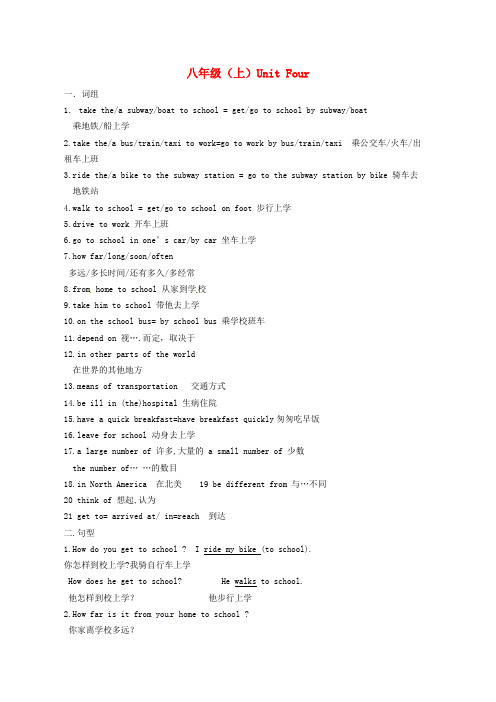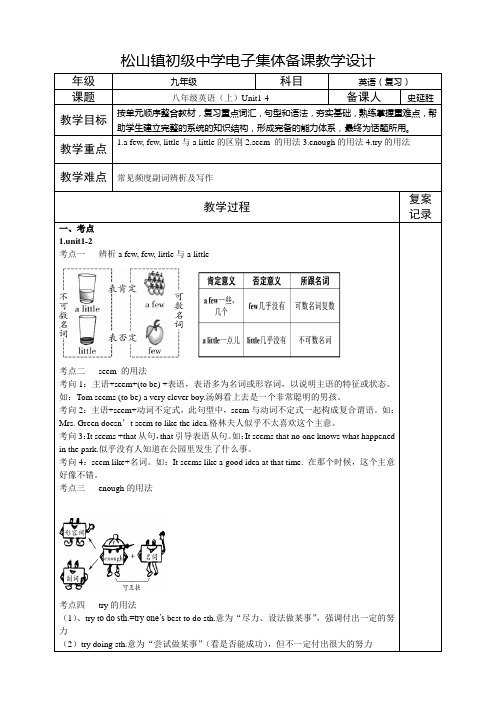中考一轮复习八上Unit4复习提纲
- 格式:doc
- 大小:44.00 KB
- 文档页数:3

八年级(上)Unit Four一.词组1.take the/a subway/boat to school = get/go to school by subway/boat乘地铁/船上学2.take the/a bus/train/taxi to work=go to work by bus/train/taxi 乘公交车/火车/出租车上班3.ride the/a bike to the subway station = go to the subway station by bike 骑车去地铁站4.walk to school = get/go to school on foot 步行上学5.drive to work 开车上班6.go to school in one’s car/by car 坐车上学7.how far/long/soon/often多远/多长时间/还有多久/多经常8.from home to school 从家到学校9.take him to school 带他去上学10.on the school bus= by school bus 乘学校班车11.depend on 视….而定,取决于12.in other parts of the world在世界的其他地方13.means of transportation 交通方式14.be ill in (the)hospital 生病住院15.have a quick breakfast=have breakfast quickly匆匆吃早饭16.leave for school 动身去上学17.a large number of 许多,大量的 a small number of 少数the number of… …的数目18.in North America 在北美 19 be different from 与…不同20 think of 想起,认为21 get to= arrived at/ in=reach 到达二.句型1.How do you get to school ? I ride my bike (to school).你怎样到校上学?我骑自行车上学How does he get to school? He walks to school.他怎样到校上学?他步行上学2.How far is it from you r home to school ?你家离学校多远?It’s three miles/ten minutes on foot/ten minutes’ wa lk.三英里/步行十分钟3.How long does it take you to get from home to school?从家到学校你通常花多长时间?It takes me 25 minutes (to get from home to school).我需要二十五分钟(It takes sb some time to do something)(某人花多长时间做某事)4. be +距离+(away) from 离某地多远Li Lei’s home is about 10 kilometers (away)from school.李雷家离学校约十公里5.That must be a lot more fun than taking a bus.那一定比坐公交车更有趣6.How far do you live from the bus station ?你住的离车站有多远?I live 10 miles from the bus station . 十英里7 He rides his bike to the bus station.= He goes to the bus station on his bike /by bike他骑自行车去公共汽车站8 Some students drive, other students / others take the bus. 一些学生开车,另一些学生乘公共汽车.9 In Japan, the most three ways of getting to school are bus, train and bike.在日本,最受欢迎的三种上学方式是公共汽车,火车和自行车10 Let me have a look. 让我看看11 If you have a problem, you can ask a policeman.如果你有麻烦,可以找警察(以if一道的条件状语从句,主句用一般将来时态或情态动词,从句用一般现在时态)If the car comes, you can get into it.If I have time , I will help you.三.基础练习1.He usu ally takes the subway to school. (划线提问)______ ______ he _______ to school ?2.她每天花费30分钟锻炼身体。

初三英语一轮复习八年级上Units 1-4人教版【本讲教育信息】一. 教学内容:一轮复习八年级上Units 1-4二. 重点短语:Unit One1. how often 多久一次2. hardly ever 几乎不3. on weekends 在周末4. once / twice a week / month 一次/两次每周/月three /four times a year 三次/四次每年once or twice a week 每周一两次5. shop/ go shopping/ do some shopping 购物6. surf the Internet 浏览因特网7. as for 至于8. want sb to do sth 想让某人做某事9. be good for 对……有益10. pretty healthy 相当健康11. eating habits 饮食习惯12. of course 当然13. look after 照顾take care of14. get good grades 获得好成绩15. a healthy lifestyle 健康的生活方式16. keep in good health 保持健康keep healthyUnit Two1. What’s the matter? 怎么了?What’s wrong?What’s the trouble?2. have a cold 患感冒have a stomachache 肚子疼have a sore throat 嗓子疼have a fever 发烧have a headache 头疼have a toothache 牙疼have a sore back 背疼3. lie down 躺下4. see a dentist 看牙医5. hot tea with honey加蜂蜜的热茶6. feel well 感觉舒服7. stressed out 紧X8. too much 太多9. a balanced diet 饮食平衡10. stay healthy 保持健康11. at the moment 此时/现在12. host family 房东13. I’m sorry to hear that…听说……我很难过。


松山镇初级中学电子集体备课教学设计
考点二seem 的用法
考向1:主语+seem+(to be) +表语,表语多为名词或形容词,以说明主语的特征或状态。
如:Tom seems (to be) a very clever boy.汤姆看上去是一个非常聪明的男孩。
考向2:主语+seem+动词不定式,此句型中,seem与动词不定式一起构成复合谓语。
如:t seem to like the idea.格林夫人似乎不太喜欢这个主意。
考点四try的用法
(1)、try t o do sth.=try one’s
考点三辨析be similar to, take after与look like
◆be similar to 指“与……相似”,多用在相近或相似的物品和情境的对比上。
如:Your situation is similar to mine. 你的处境和我的相似。
◆take after 指“长得像”或“行为、性格等像”,尤其指长得像自己的长辈。
如:Lucy takes。

人教版中考一轮复习八年级上册3-4单元知识汇总与练习一、词汇1 镜子____________2 成绩等级_________3 谚语_______4 心脏________5 事实____________6 信息;消息_______7 手臂________8 剧场_________9 座位____________10 屏幕;银幕________11 歌曲________12 记者________ 13 服务___________14 菜单_____________15 天赋________16 分享;共用__________17 挑选;选择______18 提供;给_________19 新鲜的;清新的__________20 有创造力的___________21 喧闹的;大声地___________22 轻柔的;安静的____________23 清楚地;清晰地___________24 真正;确实_____________25 便宜地;低廉地_____________26 细致地;小心地;谨慎地_________ 27 两个;两个都( adj. pron) _________28 笑;发笑(v. )笑声(n. ) ___________二、重难点单词讲解1.辨析win与beat2.both3.辨析reach,get to与arrive4.make5.How do you like…?讲解版1.辨析win与beatwin意为“赢;获胜”,通常接“game,war,match,prize”等之类的名词作宾语,即win sth. beat意为“击败”,后跟表示与之比赛、战斗的名词或代表群体的名词,即beat sb.2.both作代词,意为“两个都”,both of+代词宾格/名词复数作限定词,意为“两者都”,放在系动词、助动词、情态动词之后,实义动词之前both…and…,意为“……和……都”;“既……又……”。

八年级Unit 3—Unit 4基础知识过关+题型演练突破高分突破一:单词突破教材词汇词汇变形1. adj.好的/ adv.好地→比较级 →最高级2. adj.大声的→ . adv. 大声地3. adv 安静地,轻柔地→ . adj.安静的4.. n 比赛,竞争,竞赛 → n 竞争者,参赛者→ . v 比赛,竞争→ . adj 有竞争力的 5.adv.清楚地,清晰地,明白地→ . adj 清楚的,清晰的,明白的→ . v.使明白,使清晰 6. . adj 有才干的,有才能的,有天赋的→ n 才能,天赋 7.. adj 真实的,确实的→ . adv 确实地,真正地8.. n关心,关爱→. v关心,关爱→. adj小心的,细心的→. adv.小心地,细心地→. adj粗心的,不小心的→. adv粗心地,不仔细地→. n粗心,大意9.. n笑声/v笑,发笑→. n笑声10.. adj严肃的,稳重的→. adv严肃地,认真地11.. adj.必需的,必要的→. adj没必要的12.. v说,显示,表明→. n谚语,格言,警句13.n手→. v递给,上交14.. v触摸,感动→. adj人感到感动的→. adj 某事某物令人感动的15.. adj类似的,相像的→. n相似性,类似性16.. adj舒适的,使人舒服的→. adv舒服地,舒适地→. adj不舒适的→ . adv不舒适地→. n舒适,安逸→. n安慰,慰藉17.. adj(在空间,时间上)接近→. adv靠近地,接近地18.. adj差的,坏的→. adv非常,很(比较级worse,最高级worst)19.. adv便宜地,低廉地→. adj便宜的20.. v选择,挑选→. n选择→. adj精选的21.. n记者→. v报到22.. n服务,接待→. v为…..服务→. n仆人23.. v扮演/ n表演者→. n男演员→. n女演员24.. adj有创造性的→. v创造→. n创造者,造物主25.. n表演者,演员→. v表演→. n表演26.n魔术师→. adj魔幻的27.. adv美好地,漂亮地→. adj漂亮的→. n美丽,漂亮28.n获胜者,优胜者→. v.赢得29.. adj贫穷的,清贫的→. n贫困,贫穷30.. adj人多的,拥挤的,挤满的→. v挤满高分突破二:短语突破1.打鼓2.跑得快3.跳得高4.和…一样努力5.更早起床6.歌唱比赛7.最重要的事8.学一些新的东西9.更加外向10.在哪些方面11.一份极好的工作12.一个勤奋的女孩13.最有才能的人14.才艺表演15.世界各地16.拥挤的地方17.等等18.各种各样的19.事实上20.做某事的方法21.有相同特征;(想法、兴趣等方面)相同22.尽力做某事23.寻找24.由……决定;25.在…中发挥作用26.赢得很好的奖项27.编造;弥补;化妆28.认真对待……29.实现30.越来越受欢迎31.例如32.最激动人心的魔术师33.唱得最动听34.贫穷的农民35.给某人提供一条路去36.街头表演者37.一个有创造力的人38.为某人树立榜样39.电影院40.大屏幕41.离……近42.离……远43.很快地买到票44.以最便宜的价格买到衣服45.最差的服务46.在镇上47.欢迎来到……48.到目前为止;49.一点也不50.没什么;没问题51.舒适的座位52.买最新鲜的食物53.最舒适地坐着54.一名受欢迎的记者55.一日三餐56.相当糟糕57.最有才能的人58.在·…·有天赋59.和…相同60.关心;在意61.嘲笑某人62.一名好的倾听者63.交朋友64.只要;既然65.使显现66.取得好成绩67.触及某人内心68.某人摔断了手臂69.与…相像的70.招聘学生助手71.小学生72.打电话咨询信息73.与……不同74.和某人很像75.和…相处得好76.与某人分享某物高分突破三:句型突破1.Sam 的头发比Tom的长。
Part one考词拓展名词1.seat n.座位;坐处→_____________v.坐→_____________(过去式/过去分词)→_____________(现在分词)2.kid n.小孩→_____________v.开玩笑→_____________(现在分词)3.service n.→ _____________ v.服务4.driver n.→_____________v.驾驶5.beginning n.→_____________v.开始→_____________(过去式)→_____________(过去分词)6. medicine n.→_____________adj.医疗的;医学的7.discussion n.→_____________V.讨论;商量8.cook n. & v.→_____________n.厨具9.scientist n.→_____________n.科学→_____________adj.科学(上)的,关于科学的10.hobby n.→_____________业余爱好cation n.→_____________adj.有教育意义的→_____________教育12.success n.→_____________v.成功→_____________adj.成功的→_____________adv.成功地动词13.choose v.→_____________(过去式)→_____________(过去分词)选择;挑选→_____________n.选择14.appear v.出现→_____________(反义词)消失→_____________n.外貌15. plan v.& n.→_____________(现在分词)→_________(过去式/过去分词)打算;计划16.stand v.→_____(过去式/过去分词)忍受;站立17.become v.→_____________(过去式)→__________(过去分词)开始变得;变成18.send v.→______(过去式/过去分词)邮寄;发送19.improve v.→_____________n.改善,提高形容词20.creative adj.→_____________v.创造21.worse adj.& adv.→_____________(最高级)最差(的);最坏(的);最糟(的)22.meaningless adj.→_______(反义词)有意义的→_____________n.意义;意思→_____________v.意思是→_____________(过去式/过去分词)23. foreign adj.→_____________n.外国人24.own adj. & pron.→_____________n.主人;物主25.main adj.→_____________adv.主要地26. unlucky adj.→____________(反义词)幸运的→_____________n.幸运,运气→_____________adv.不幸地→_____________(反义词)幸运地27.simple adj.→_____________adv.简单地副词28.cheaply adv.→_____________adj.→_____________便宜的→_____________(反义词)fortably adv.→___________adj.使人舒服的;舒适的30.beautifully adv.→_____________adj.漂亮的→_____________n.美Part two 重点短语归纳be 动词短语1._____________是...的职责;由...决定2._____________在...方面有才能3._____________因...而著名4._____________准备好(做某事);愿意(做某事)5._____________能够做某事6._____________确信;对...有把握动副短语7_____________编造(故事、谎言等)8._____________查明;弄清9._____________写下;记录下10._____________(尤指为消遣)学着做;开始做11._____________长大;成长;成熟动词短语12._____________认真对待...13._____________关于;与...有关系14._____________干得好15._____________发挥作用;有影响16._____________尽...最大的努力17._____________坚持18._____________从...回来19._____________有相同特征;(想法,兴趣)相同其他短语20._____________只要;既然21._____________在...开始22._____________...的象征23._____________由于这个原因24._____________和...相同25._____________各种类型的;各种各样的26._____________例如27._____________到目前为止;迄今为止重点词汇拓展1.sit sat sitting2.kid kidding3.serve4.drive5.begin began begun6.medical7.discuss8.cooker9.science scientific 10.hobbies 11. educational educate 12.succeed successful successfully 13.chose chosen choice 14.disappear appearance 15.planning planned 16.stood 17.became become 18.sent19.improvement 20.create 21.worst 22.meaningful meaning mean meant 23.foreigner 24.owner 25.mainly 26.lucky luck unluckily luckily 27.simply 28.cheap expensive fortable 30.beautiful beauty重点短语归纳1.be up to2.be talented in3.be famous for4.be ready to5.be able to6.be sure about7.make up8.find out9.write down 10.take up 11.grow up 12.take...seriously 13.have to do with 14.do a good job 15. play a role 16. try/do one's best 17.keep on 18.get back from 19.have...in common 20.as long as 21. at the beginningof 22.a symbol of 23.for this reason 24.the same as 25.all kinds of 26.for example 27.so farPart three 名师解读考点1: provide/give/offer1.-How's it going,Tina?-Great.My company has_________ me a good job.A.offeredB.providedC.introducedD.discovered2.In the world,more than 30% of schools do not provide safe drinking water____ about 570 million children.A.withB.forC.towardsD.against3.对我们来说,在网上暴露过多的个人信息是很危险的。
_________学校 8 年级上册英语Units 4 复习教学案总第课时【一言辨异】I'm sure you can beat others and win the game.我相信你能战胜其他选手,赢得比赛。
3.辨析both与all【考点抢测】both all11.There are three foreigners in our class.________of them are American.12.Lucy and Lily ________agree with us.13.Why not eat ________of the fish?14.—How are your parents?—They're ________fine.15.There are tall trees on ________sides of the street.()16.(2015荆门中考)—Which of the two magazines will you take?—I'll take ________ though I find ________ of them are very useful to me.A.all;both B.either;eitherC.either;both【满分点拨】both与all的区别“都”不同both表示“两者都”,其反义词为neither。
—My parents both like Beijing Opera.我的父母都喜欢京剧。
all表示“三者或三者以上都”,其反义词为none。
—Bill is the tallest of all the boys.比尔是所有男孩中最高的。
both…and…意为“……和……都;既……又……”,常用来连接两个并列的句子成分;连接两并列的主语时,谓语动词用复数形式。
Both John and David are from America.约翰大卫都来自美国。
Unit 4 How do you get to school?【复习目标】1. 学会谈论交通工具2.合理安排行程,并合理选用交通工具【核心知识】1. How do you get to school? I ride my bike.2. How does he get to school? He takes the train.3. 问多长时间How long does it take? It takes about 10 minutes.4. 问路程How far is it ? How far is it from home to school? It is about 10 kilometers.5. Don’t worry.6. by bike, by bus, by subway, by taxi, by boat, by car, by train (乘坐……车,放在句尾)7. take the taxi/ train/ bus/ subway/ car 3. ride a bike 骑自行车8. walk to + 地点走到……【应掌握的词组】1.take a ( the ) subway to…= go to …by subway 搭地铁去……2.take a ( the ) train to……= go to …by train 坐火车去……3.take a car to … = go to … by car ( in a car )坐汽车去……4.take a ( the ) bus to…= go to …by bus ( on a bus ) 乘坐公共汽车去……5.take a ( the ) taxi to…= go to …by taxi ( in a taxi ) 坐的士去……6.take a plane to … = fly to … = go to …by plane ( in a plane ) 乘飞机去……7.go to school by boat = take a boat to school 坐船去上学8.ride a bike / bicycle to… = ride to …= go to …by bike / bicycle骑自行车去……9.driv e a car to …= drive to … = go to …by car ( in a car ) 开车去……10.walk to…= go to …on foot 步行去……11.go in a parents’ car坐父母的车12.get to school = arrive at school 到达学校13.get to = arrive in ( at ) = reach到达14.get ( arrive, reach ) home ( here, there ) 到家(这儿,那儿)15. 10 kilometers from school离学校10公里(远)16.from his home to school从他家到学校17.how far(用于提问距离)多远18.have a quick breakfast 快速地吃早餐19.leave for school 出发去学校20.the early ( late ) bus 早( 晚) 班车21.take sb. to school 带某人去学校22.take sb. / sth. home / there 带……回家/ 到那儿23.bus ride搭公车的路程24.bus stop公车亭25.bus station公车站26.rain ( subway ) station 火车( 地铁)站27.think of认为28.not all students不是所有的学生29.around the world=all over the world遍及全世界30.in North America在北美洲31.on the school bus 乘/坐校车32.in other parts of the world 在世界上的其他地方33.one …the other一个……另一个34.others = other (students) 其他的(学生)35.things are different 情况不同36.make a difference to 对……产生影响37.depend on 取决于/依赖/依靠38.must be 肯定/一定是39.the most popular ways ( of doing sth.)(做……)最流行的方式40.means of transportation 交通方式41.a small number of + pl. 小部分的42.a large / great number of + pl. 大多数的43.the number of + pl. ……的数量(谓语是单数) 44.on the weekend = on weekends 在周末45. be ill in ( the ) hospital生病住院46.worry about sb. /sth. 担心某人/某事47.be worried about sb. / sth. 担心某人/某事【应掌握的句子】1. How do you get to school? I walk to school.你是怎样到校的?我步行。
疑问词how 在这里是对方式进行提问I ride my bike / walk / take the subway . By bike /bicycle / bus / train / subway / taxi / air / plane / ship / boat . On foot .How do I get there ? 因there是副词,所以不能说get to there2. How long does it take you to get to school? It takes about 10 minutes to walk and 15 minutes by bus.? 你需要多长时间到校?步行大约10分钟,乘汽车15分钟。
疑问词hwo long是对时间长短或事物的长度提问How long does t take you to get from home to school ?It takes twenty-five minutes . →take sb. some time to do sth. 花费某人……时间做某事3. I usually walk but sometimes I take the bus我通常步行,但有时坐公共汽车。
5. How far is it from his home to school? About 10 kilometers. 从他家到学校有多远?大约10公里。
疑问词how far在这里是对距离进行提问How far do you live from school ? I live 10 miles from school .6. Lin Fei’s home is about 10 kilometers from school.林飞的家离学校大约10公里7. He leaves for school at around six-thirty. 他大约在6点30分动身去学校。
8. Then the early bus takes him to school.然后,他乘坐早班车到学校。
9. In other parts of the world , things are different .在世界的其他地区,情况就不同了.10. In Japan, most students take trains to school, although others also walk or ride their bikes.在日本,大部分学生乘坐火车上学,尽管其他人也步行或骑自行车。
11.In China , it depends on where you live. 在中国这要取决于你在哪里.depend on 视……而定;决定于11. That must be a lot more fun than taking a bus. 那肯定比坐公车有趣得多。
☆ (1)表推测:must be 一定、必定、肯定用于肯定句中;may be 可能是;can’t be 不可能,用于否定句中。
12. A small number of students take the subway to school.小部分学生乘坐地铁上学 a number of = many 许多☆ a number of + 复数名词作主语,动词用复数“许多”=many 可用large/great/small 修饰,表程度。
☆the number of + 复数名词作主语,动词用单数“…..的数量”A great number of students are young.14.What do you think of_the transportation in your town?你对你们镇的交通认为怎么样?thinkof 对……有某种看法15.have a big/rich/light/quick breakfast 吃丰盛的/少量的早餐have a quick breakfast= have breakfast quickly 很快吃完早餐[近义词辨析]1.take+限定词+交通工具与by+交通工具相同点:二者均可表示“乘某种交通工具”。
不同点:take为动词,因此take所构成的短语常作谓语;by为介词,因此该介词短语常作方式状语。
Take短语中的交通工具名词前要有限定词(冠词、形容词性物主代词或指示代词),by短语中的交通工具名词前不能要任何限定词。
如:My sisiter takes the car to go to work every day.我姐姐每天开车去上班。
Jim goes to school by bike every day.吉姆每天骑自行车去上学。
2.ill与sick相同点:二者均可表示“生病的”。
不同点:ill表示“健康不佳的,生病的”;但不用作定语,只能作表语,ill的名词形式是illness,ill 的比较等级的变化为:ill—worse—worst. Sick表示“反胃的,呕吐的”,只能用作表语;表示“生病的,不舒服的”时,可以作表语也可以作定语。